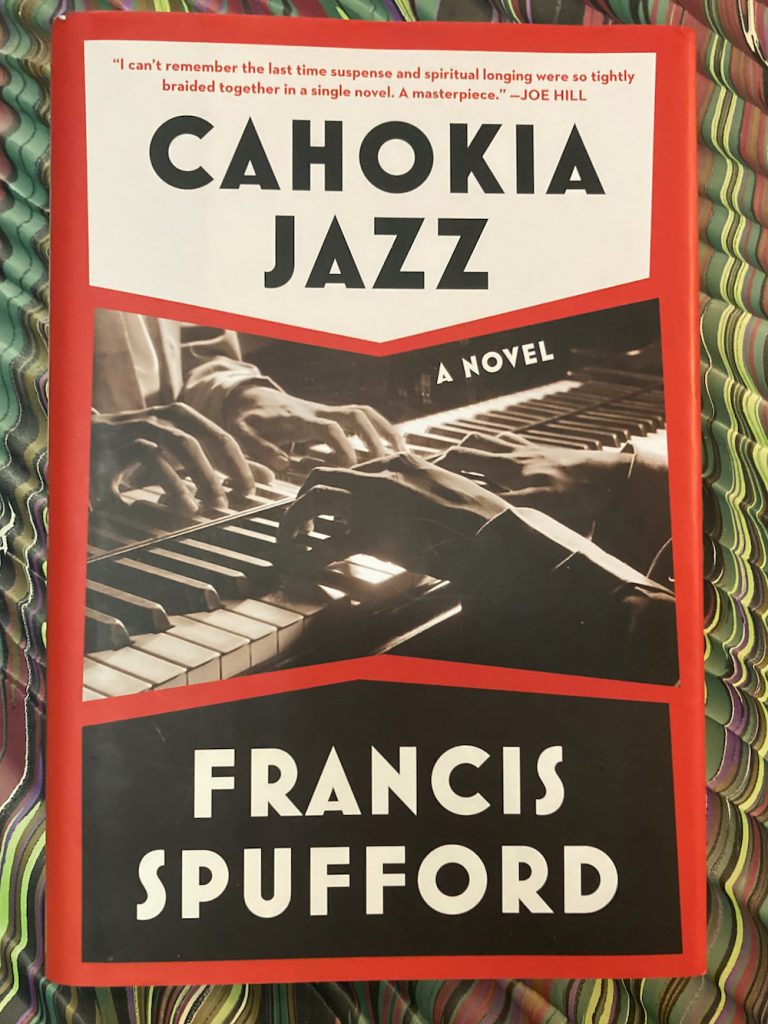
— Francis Spufford. Cahokia Jazz [2023]. Scribners, [February 2024].
Cahokia Jazz is a Prohibition novel, a jazz novel, a detective novel, and an excellent science fiction novel set in an alternate America, and the best new book I read in 2024 (it was published in England last autumn but I did not see a copy).
The novel opens with the investigation of a gruesome crime by two Cahokia police detectives. Joe Barrow is a deracinated veteran of the an Indian orphanage school and the first world war. It’s a toss-up which was the harder school. Phin Drummond, is also a veteran of the trenches, a poor white opportunist and a joker in the face of death. Barrow plays piano in speakeasies and hotel nightclubs, and Cahokia Jazz rolls out to the plink and rumble of piano music from ragtime to Satie to Jelly Roll Morton.
How many ways can the dominant Anglo-Norman colonial history of North America be subverted ? It’s one thing to invoke a distinguished name, as Spufford does with the novel’s sly dedication ; it’s another to deliver the goods. The narrative of Cahokia Jazz is not rote or formulaic but organically rooted in language and anthropology and invented historical documents. To get technical for a moment, the Jonbar Point is a milder Columbian exchange and the introduction of a less virulent strain of smallpox to the Americas, so that indigenous populations survive in larger numbers and the political and cultural shape of the continental United States is altered. St. Louis remains a small rural trading post ; on the east bank of the Mississippi, Cahokia is the industrial powerhouse and nexus of commerce and transportation. This is another America, but certain characteristics persist and Spufford plays the tensions well : the polity of Cahokia is a syncretic multi-ethnic Catholic commonwealth with an indigenous American aristocracy whose matriarchal line of succession contrasts with the Protestant merchant-industrialist capitalists slavering at the opportunities they seek to create by fomenting unrest and playing the Red Menace card. An investor says, “One hopes that when the, ah, obstacles of the present arrangements have been cleared away, the place will still preserve its character. As much as possible, anyhow.”
One arc of the novel is Joe’s recovery of his takouma (indigenous) heritage through his connections with the Sun and Moon. The Sun is the de facto ruler of Cahokia — Harvard-educated, cosmopolitan descendant of the long line of princes, with a Boston Brahmin drawl, “long hair and earrings and a face the color of old, oiled wood”, and someone deeply attentive to the power of symbols. “The Man” gives Joe his card (like the Provót “ASSIST” in Avram Davidson’s Eszterhazy tale “The Crown Jewels of Jerusalem”) to ensure the cooperation of the takouma population, and brings Joe along to witness the Green Corn Planting ceremony in a rural suburb. Joe meets the Moon — the niece of the Sun, stylish couturière and cultural benefactor of Cahokia. She tells him the tale of Thrown-Away Boy and his brother Lodge Boy, and he accompanies her to a dinner at the Frank Lloyd Wright designed Algonkian Hotel.
At any moment the relationship between the two detectives could edge into Laurel and Hardy — or Natty Bumppo and Chingachgook, or the Keystone Kops — but it doesn’t. Cahokia is a gritty, stinking, beautiful city, seething in the build-up to a KKK riot, and as the detectives criss-cross the map in search of the murderer, they meet and interview individuals so distinctive — German gangsters, a tough-talking red-headed newspaper reporter, hicks, takouma crazies and political activists and poets and office workers — that the moments of wit and levity never tumble into slapstick. There are many pleasures throughout the novel, some involving a sense of alternate possibilities. Spufford integrates ritual and mystery into a twentieth-century America : the appearance of the Four Winds Society when Joe joins the detective bureau is a rite of welcome by his colleagues in masks, but the power of that society is revealed when the police are suddenly ushered out of a takouma neighborhood by citizens whose masks no longer seem so benign. Another delight is the long scene in the Algonkian’s Catawba Room, where Joe meets the takouma cultural elite and a visiting professor of Anthropology, sits in at the piano with the band, and dances with the Moon. The week of the novel is packed with incident.
“To arrest, for the space of a breath, the hands busy about the work of the earth”, as Conrad wrote : the effect upon the reader, that’s what it all comes down to. Cahokia Jazz makes it happen.
The Endless Bookshelf book of the year 2024.
